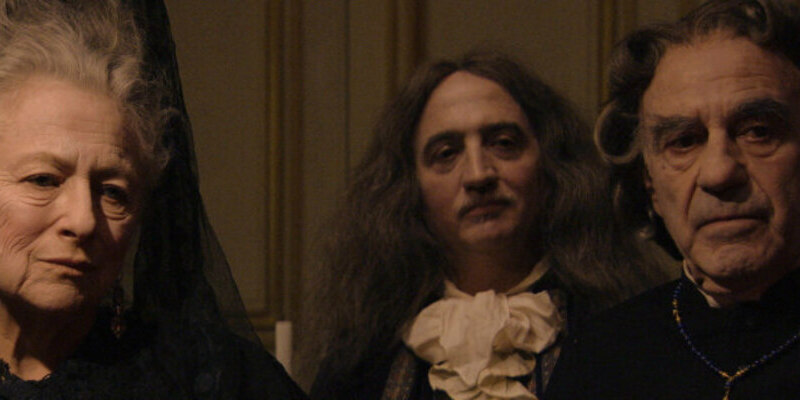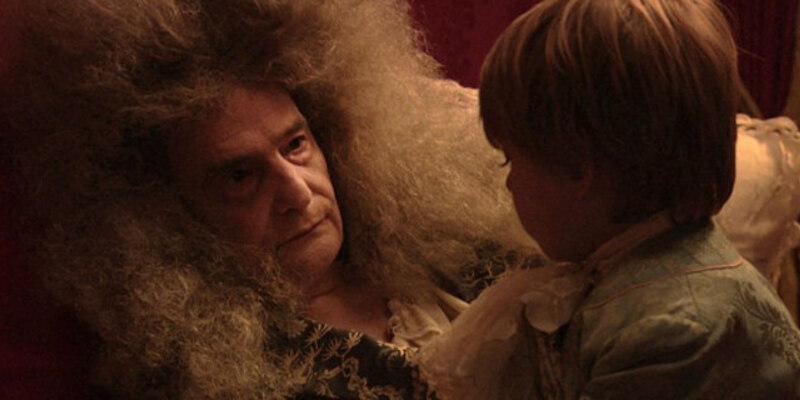
Review by
Benjamin Poole
Directed by: Albert Serra
Starring: Jean-Pierre Leaud, Patrick d'Assumcao, Marc Susini,
Irene Silvagni, Bernard Belin, Jacques Henric

Remember being five years old? Sticky fingers, playing conkers, jumpers for
goalposts? Not for Louis the Great, the 17th/18th century French monarch: at
five the lad was in charge of an entire country! And he must have been good
at it too, as Louis XIV, aka the Sun King, remained the ruler of France for
72 years (the longest recorded reign of a monarch in European history).
What's more, Louis' sovereignty concurred with a period in French history
wherein the country's influence and power was consolidated; leading the
charge in three European wars, crushing France's Protestant faction and
inadvertently setting the ground for revolution by establishing an approach
of supreme monarchical authority (good going for a five year old). So, when
Louis XIV passed on in 1715, this was not just the death of a Protestant
bothering warmonger, but the end of an epoch for France: the king didn't
even have an heir apparent, which ensued political upheaval in his wake, as
Louis had outlived all of his legitimate offspring (again, not bad for a
five year old).

Thierry Lounas and Albert Serra's much exalted
The Death of Louis XIV details the protracted death of the
king as he falls foul of a gangrene infection. And, bon sang, is it
protracted: at almost two hours of long takes, grim narrative simplicity and
unflinching observational focus, this is slow cinema at its slowest and most
cinematic. Serra's film details a process: filming largely in tight medium
shots, which for the most part foreground the king on his death bed (played,
in a triumph of casting, by the legendary Jean-Pierre Leaud), we
witness the deterioration of the king - and via metonymic resonance, the
state - in majestic, reserved concentration.

At such length, it's just as well that
The Death of Louis XIV is gorgeous to look at.
Jonathan Ricquebourg's chiaroscuro cinematography of deep browns and
burnished orange deliberately recall the shadowed verisimilitude of Dutch
masters, a style which is indeed replicated in the very portraits that hang
in the king's boudoir. Throughout the expiration, the king's dignity is
preserved - even in death he is obligated to wear a series of fright wigs
that make him look like an exhausted Brian May. Assorted courtiers
hopelessly lie about the severity of his injury (is there a more terrifying
colour than the chalkboard black of skin infected with gangrene?), even as
Louis in turn puts a brave face on it for the court. Assorted valets clap
when the king dons a hat, applaud when he cracks open a boiled egg. It is
both sad and ridiculous, but then death itself is absurd in its clumsy and
indignant inevitability, a truth that this film seeks to explore.

At the centre of it all is Leaud's imperial performance; his Louis is
corpulent and solitary, but magnetic as his denial gives way to regret and,
ultimately, grim resignation ("Everything disgusts me," he ruminates towards
the end). The casting of Leaud has a particular poignancy: audiences have
seen this actor grow up from the little boy in
Les Quatre Cents Coups and its various follow-ons to become a
grand old dame of Cinema de France, and, just as Louis XIV's life was
integral to French history, so too is Leaud's work entwined with the New
Wave. The resonance of Leaud's casting, along with its painterly
mise-en-scene and perfect composition, makes it easy to understand how
The Death of Louis XIV has been so beloved of cineastes.
However, as the static camerawork and oppressive airlessness begins to
overwhelm (this is, after all two hours of watching an old man die) the rest
of us may say vive la difference to The Death of Louis XIV's stifling atmosphere of pomp and deathly circumstance.

The Death of Louis XIV is on MUBI UK
now.
